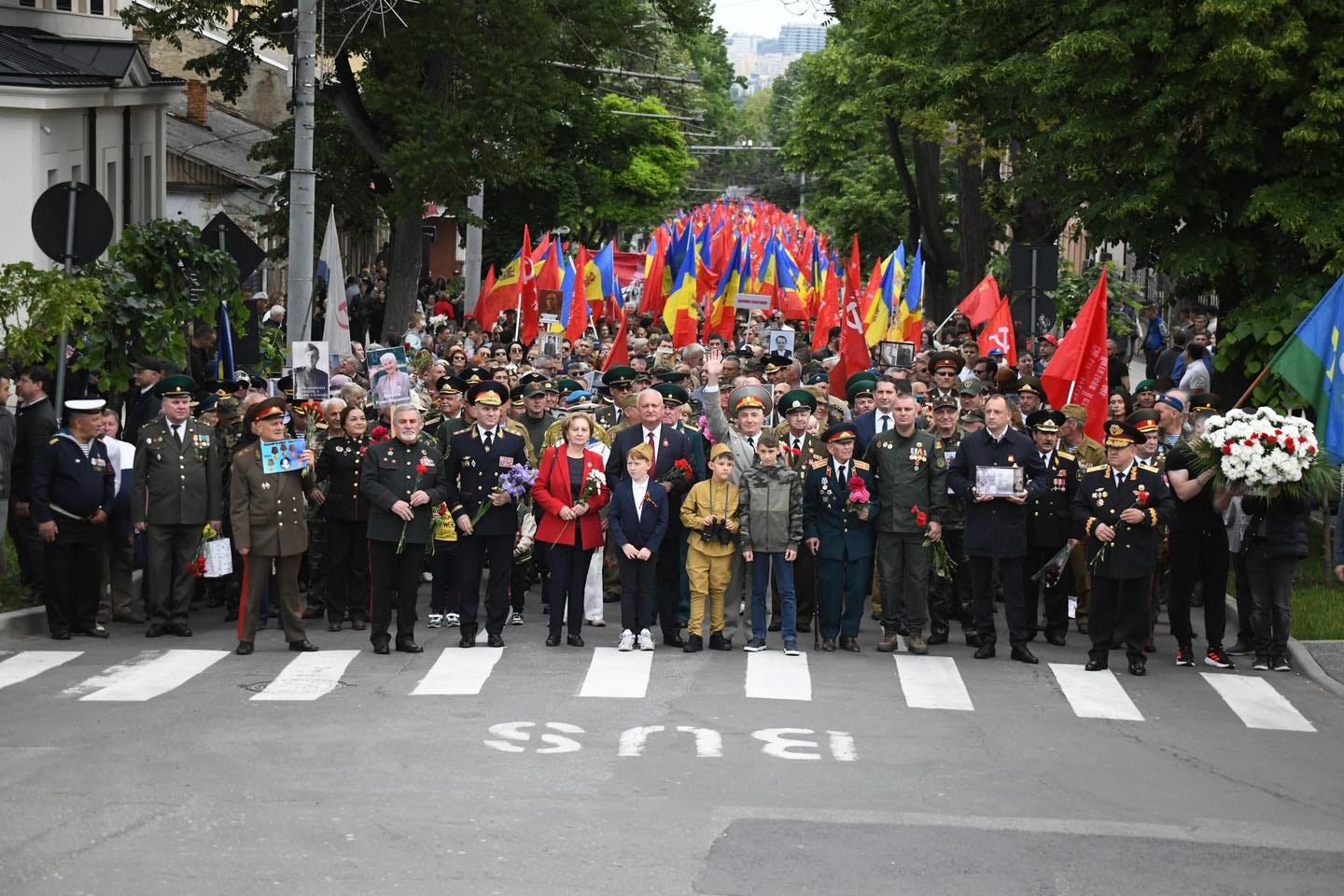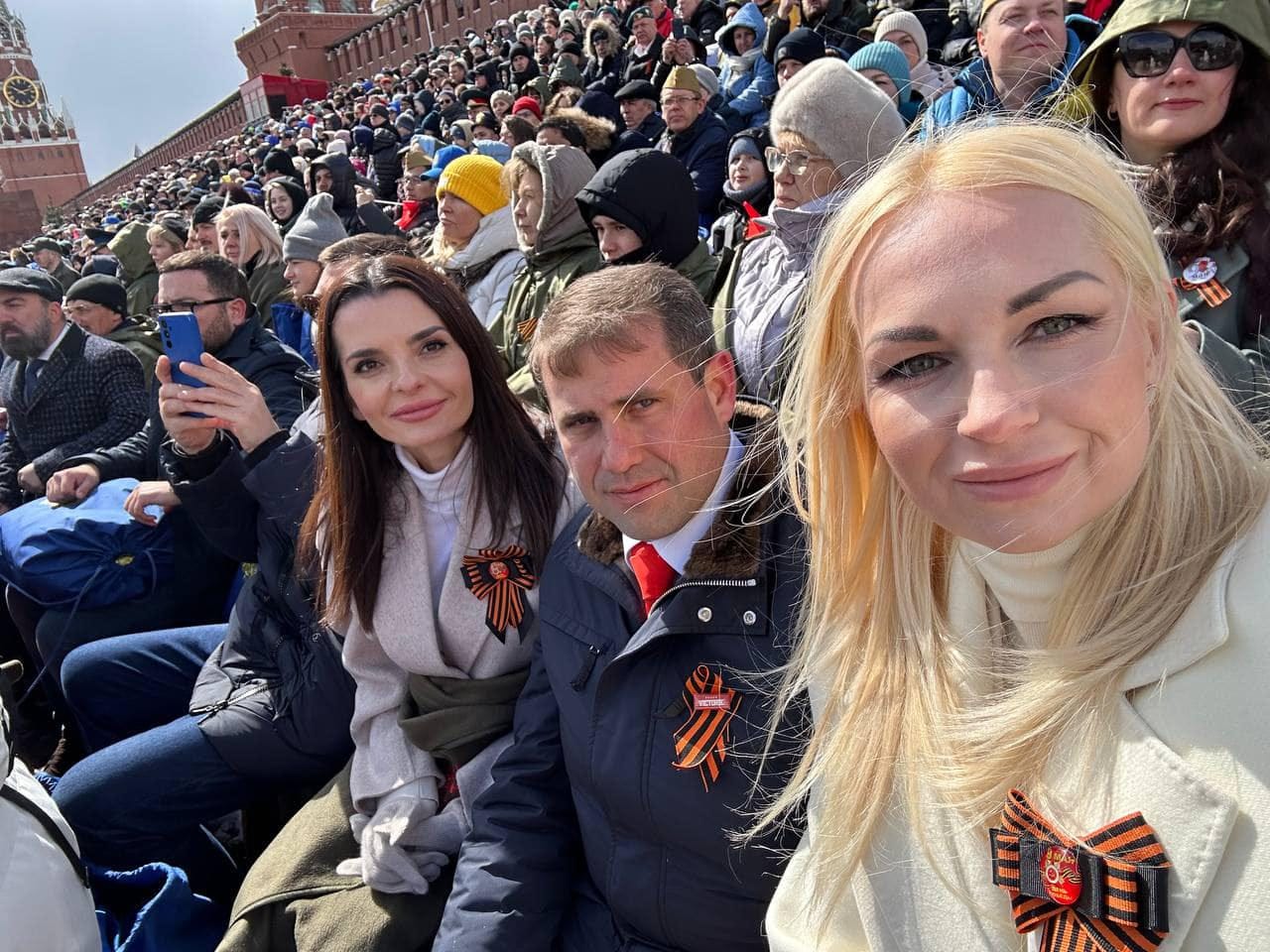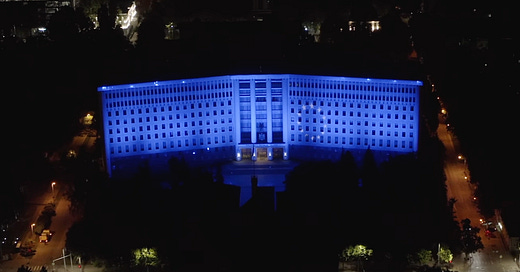Today’s quick hit is going to focus on the complicated interplay of 2 holidays celebrated on May 9th, Victory Day and Europe Day. Right now we are near the end of a solid 2 week block of major holidays in Moldova. First there was May 1st (May Day) followed by Orthodox Easter, followed by May 9th, followed by Memorial Easter (3rd Easter for anyone counting). In this mix we’ve gotten a bit behind on the Weekly Roundup but today I feel it’s important to focus on May 9th separately. I’ll follow this in the near future with an article getting us caught up on other non-holiday news.
Victory Day and Europe Day
On May 9th Moldova marks 2 holidays that represent different approaches to the same history. On May 8th 1945 Nazi Germany officially surrendered to the allies with the cessation of hostilities scheduled for 23:01 (11:01 pm). In Western Europe and the United States May 8th is called “VE Day” or Victory in Europe Day, a title reflecting the fact that the war against Japan was ongoing. The Soviet Union, at the decision of Stalin, chose to recognize the end of the war on May 9th since 23:01 German time was 00:01 (12:01 AM) Moscow time. This day became known as “Victory Day” reflecting the fact that the Soviet Union remained neutral in the Pacific theater.
Since the end of the Second World War the Soviet Union, and then various (but not all) successor states, have marked May 9th as a holiday on and off. Russia did not mark the date in the early 90s but with the rise of Vladimir Putin it became one of the most important holidays in the Russian year. Increasingly Victory Day has become a day for militant expressions of Russian nationalism and past military glory.
Europe Day also derives its origin from the end of the Second World War. It marks the date of the Schuman Declaration, made on May 9th, 1950, the day after the 5th anniversary of the end of the war. This declaration paved the way for the creation of the European Coal and Steel Community, a precursor to the European Union and the beginning of what has become the most ambitious peace project in history.
So May 9th represents two divergent takes on the same historical event. In its modern form Victory Day celebrates victory by force of arms and commemorates the sacrifice of those who died in the conflict. Europe Day marks the first day of peace and the project to unite Europe in order to prevent a repeat of the World Wars.
In Moldova this has created a divide, largely driven by the pro-Russian political parties which see Europe Day as an unwelcome imposition on a holiday they see as a patriotic day (in the sense of Russian patriotism). At the same time, it isn’t all that clear. Many people celebrate both days, remembering lost family members and the sacrifice of the past generation while also celebrating the peace that followed the war.
Victory Day in Moldova
The main event of Victory Day celebrations in Moldova is traditionally a march, technically organized by the non-partisan Victory Committee, but practically dominated by the Socialist and Communist Parties. This march does not include partisan political signage but leans heavily into Soviet symbolism and nostalgia. Many people, especially children, dress up in WW2 Soviet army uniforms. Also, people carry framed pictures of family members who were veterans of the war that have since passed away - something called the “Immortal Regiment”

This year the march was led by Igor Dodon and the procession wound through the city center and ended at the Chisinau war memorial. Shor party members and affiliates joined the march this year, in contrast to past year’s where Shor’s people held their own march. The Socialist party indicated that they were not particularly happy about this, but that organizational constraints meant that only one march could be held this year and they couldn’t control who joined it.
Of those marching, many wore a ribbon of the St. George’s Banner, which has been banned in Moldova since 2022 as a symbol of Russian aggression. Police indicated that 150 people were fined for this display. ZdG spotted at least 10 politicians, from the Socialist, Communist and Shor Parties, wearing the banner at the march. It is unclear if any of them were fined.
Politicians of all parties marked the occasion by visiting the war memorial and laying flowers commemorating those who fought Nazi Germany. President Sandu laid flowers at the memorial noting that at least 56,000 Moldovans died in the war including her grandfather’s brother. She said "They died so that we could live in peace."
Marches and commemorations also took place in Transnistria, but for the second year in a row no parades of military equipment took place. Transnistrian “leader” Vadim Krasnoselsky made statements on the holiday stressing that the region has no desire for conflict with Moldova saying:
“Of course, there are many things that separate us, we have different attitudes towards history, but in our understanding of the world we coincide. Transnistria definitely does not want war. War is actually easy to start, but very difficult to end. We must have wisdom and understanding and prevent this escalation and ultimately war,”
Victory Day in Moscow
Russia also marked victory day with parades and events, though with noticeably less military hardware than in past years. President Putin congratulated by name the leaders of many former Soviet states and “the people” of Moldova and Georgia.
Bashkan Gutsel was in Moscow for the events where she met up with Ilan Shor and Marina Tauber. They attended the Victory Day parade and listened to Putin’s speech.

During the day the Bashkan made a statement saying:
"It is a great honor for me to represent Gagauzia and all of Moldova at this event. I thank Russian President Vladimir Vladimirovich Putin for the invitation to participate in these festive events. This is a high sign of friendship and trust between our peoples"
Responding to questions about the meeting of opposition figures in Moscow, government spokesman Daniel Voda said to journalists:
"While here, in the capital of the Republic of Moldova, on the emblematic Great National Assembly Square, thousands of people celebrate peace, freedom and Europe, we see that three people stayed in the Kremlin, in the country that brought war back to the European continent, and pretend that he represents the Republic of Moldova."
Europe Day in Moldova
The night before May 9th the parliament was lit up with the flag of the European Union in anticipation of Europe Day.
In Chisinau, Europe Day was celebrated with a “European Village” which was organized in the center of the city and featured speeches, concerts and food and games. The European Delegation helped organize the event which highlighted the EU’s support for Moldova.
These events stressed Moldova’s European ambitions and the importance of peace on the continent. Head of the European Delegation to Moldova Jānis Mažeiks posted a statement on the holiday where he took aim at Russia’s war and aggression saying:
"On Europe Day we remind ourselves that the European Union is a project of peace. Russia's current brutal war against Ukraine reminds us how important it is to advocate and work together for peace. This requires joint efforts, solidarity and deep respect for human dignity. Peace does not mean economic blackmail or manipulating the price of natural gas. Peace cannot be achieved by threats or gunfire. Peace cannot be achieved through disinformation and propaganda. Peace means freedom and prosperity"
Speaking to the massive crowd, President Sandu underlined the dual nature of the day saying:
"Today is a day with double meaning for Moldova and for the whole world. On May 8, 1945, victory over Nazism was announced and a war ended. May 9, 1945 was the first day of peace in Europe"
A Day Filled with Symbolism
This year May 9th shone as a clear example of the two Moldovas. One thread looks to the east and the to past. The other looks west and to the future. While no one marched in support of Russia’s war in Ukraine, those celebrating Victory Day made little attempt to distance themselves from Russian aggression either. Meanwhile, Europe Day stood in full contrast to the war and what it represents, stressing a free Europe that maintains peace through integration and unity.
Many Moldovans celebrate of mark both holidays on May 9th. Those who do usually stress Victory Day as a day of remembrance of the sacrifices and struggles of the past, not as a jingoistic symbol of Russian force of arms. In this day there is a lot of nuance and at the same time starkly contrasting visions of both the past and the future.
It’s worth noting just how far Russia’s concept of the Great Patriotic War has now drifted from that of the Western Allies. This remains starkly clear for all of free Eastern Europe in the remembrance banners showing the dates of the war - 1941 - 1945. No mention is made of the Molotov–Ribbentrop Pact, the partition of Poland, the annexation of Moldova and Russia and Germany’s short lived alliance to carve up Europe. Similarly, Russia sees no contradiction in claiming that Ukraine is run by Nazis while acknowledging the Ukraine’s president is Jewish. In modern Russia history is something malleable and is often weaponized. In Moldova, the past is complicated and narratives trying to find meaning in the years of war and then Soviet occupation run up against complex feelings of nostalgia. No where is this more on display than May 9th.





Very clear, insightful article. It does put into good perspective the two points of view that exist toward the celebration of this holiday. In the US, V-E day is hardly mentioned anymore.